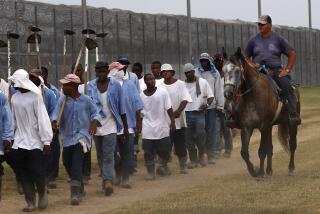‘Voluntary’ Work Rewarded by Sandinistas, Others Reported Abused : Freed Somoza Guards Describe Life in Prison
- Share via
MANAGUA, Nicaragua — During nearly 10 years in a Sandinista prison for his service in the pre-revolutionary National Guard, Octavio Borgen had plenty of time to count. He said his jailers beat him 27 times.
Thirty-five times, the former captain recalled, he was put in a dark punishment cell with no room to lie down. Five times he was taken from his cell in Modelo Prison to El Chipote, a notorious interrogation center. Once he endured three days of hostile questioning without sleep.
Until his release last Friday in a mass pardon of 1,894 former guards, Borgen said he was repeatedly castigated for his refusal to submit to prisoner “re-education,” a regimen of daily labor and weekly political lectures aimed at adapting the soldiers of a defeated army to life under Sandinista rule.
Judging from random interviews with 20 of the freed ex-guards, who were pardoned under a Central American peace agreement, the Sandinistas systematically abuse prisoners who do not work and reward those who do, even though the work program is supposedly voluntary.
No Reason to Repent
Many of those prisoners who worked said they did so to gain more freedom inside the jail and did not regard their decision as a sellout. All those interviewed said they did nothing criminal as guards and had no reason to repent.
Former guards who refused to work spoke of imprisonment as an extreme test of their principles.
“To accept re-education would have been to admit guilt and become a slave of the system,” the 45-year-old Borgen told a visitor at home on his first full day of freedom. “But not to accept it meant to live for years in a situation of extreme tension.”
In an acknowledgement of its discriminatory treatment of prisoners, the government excluded 27 non-working inmates from last week’s pardon. Under the Feb. 14 peace accord, all former guards were to be freed except those found guilty of serious crimes during the Sandinista-led uprising against President Anastasio Somoza in the late 1970s.
But in testimony before a National Assembly panel, the chief of Nicaragua’s prison system asked that 29 be kept in jail for their “hostile attitude toward the re-education process.”
The Sandinista-dominated assembly voted to deny pardons to 27 of those prisoners. Twelve others were kept in jail on the basis of criminal records. Those 39 are serving 15- and 30-year terms.
Most guards rejected prison labor until the mid-1980s. The holdouts eventually dwindled to about 700, but they were joined in their refusal to work by several hundred prisoners who are still held on charges of aiding the U.S.-backed Contras.
All the non-working prisoners call themselves plantados, after the Cuban inmates who reject re-education by Fidel Castro’s Communist government.
As a matter of regulation, working prisoners are allowed family visits every 15 days and may receive unlimited quantities of food from them. Non-workers get to see their families every 45 days, and food deliveries are limited to 15 pounds.
At the Modelo Prison in Tipitapa, home for most anti-Sandinista prisoners, workers are kept in separate galleries with access to television and may hold special religious services, such as baptisms, outside the jail--privileges denied to non-workers. Only workers are eligible for weekend furloughs.
Non-workers are confined to their cells except for one hour of weekly exercise, while working prisoners leave every day to grow food, make army boots and uniforms, repair official vehicles, make car license plates and mix concrete for prefabricated government houses--jobs for which they are paid a fraction of the minimum wage.
Besides such formal distinctions, non-workers freed last week said they were subjected to physical and psychological pressures aimed at forcing them to work.
Those pressures ranged from beatings and confinement in punishment cells to such harassment as dumping prisoners’ food on the floor and denying them access to visitors or to showers.
One non-working prisoner said that he was deliberately kept in an ill-fitting uniform and that his sewing needle was seized when he tried to alter the fit. Others said working prisoners were infiltrated among the plantados to report violations of prison rules, such as reading the opposition newspaper La Prensa.
‘Jungle of Spies’
“Our gallery was a jungle of spies,” said Hazel Maraz, 26, a former guardsman freed last week.
Americas Watch, a U.S.-based human rights organization, has criticized the Sandinistas for punishing prisoners for refusing to work. It objected to the decision to exclude 27 such prisoners from the pardon.
“We have problems with keeping people in prison because of their behavior in prison,” said Juan Mendez, a Washington spokesman for Americas Watch. “That behavior has nothing to do with guilt or innocence.”
But the Sandinista prison chief, Alvaro Guzman, said the 27 were punished for leading the resistance to re-education and threatening prisoners who worked. “This small group represents the essence of Somocismo (Somoza philosophy) inside the prison,” Guzman said.
Former plantados denied they had leaders. They said some of the 27 were denied pardons for having been high-ranking guard officers or writing letters from prison publicizing abusive treatment.
“Our discipline was not that of a military hierarchy,” said Borgen, the former guard captain. “The guard was finished, but we maintained our self-respect. The Sandinistas never understood this.”
Clara Obando, wife of the highest-ranking plantado, former National Guard Col. Silvio Mayorga, said her husband asked her advice on whether he should work, pointing out that she could visit him more often if he did.
“I told him no,” she said. “He is a trained engineer. I knew that if he worked with a machete, it would finish him morally.” Mayorga was among those denied a pardon last week.
Sandinista officials insist that prisoner re-education is for the protection of society because it teaches useful job skills to one-time enemy soldiers trained for little else but war. They say the political lectures are largely informative, like civics classes.
“The revolution was made to free man of his negative habits, his deforming tendencies, his vices,” Interior Minister Tomas Borge said in a recent speech defending the program.
Some working prisoners freed last week said they viewed the program as positive.
“It was quite useful, because we knew nothing, for example, about the Sandinista constitution,” said Pedro Antonio Gonzalez, 27. “We began to see things more objectively.”
Gonzalez, a farm youth with a sixth-grade education when he joined the National Guard, said he decided to start prison work in 1985, after a spiritual conversion to Christianity. Partly to see his parents more often and partly to gain the “emotional freedom” to train himself as a pastor, he said he volunteered to learn to maintain prison vehicles.
“I wasn’t working for the regime but out of Christian love for my fellow man, to rid myself of hatred and rancor,” Gonzalez said.
The former guardsman spoke last Saturday evening after a Managua service of the Church of God, a Pentecostal sect headed in Nicaragua by a former guard officer pardoned in 1985. The church encouraged inmates to work and gained hundreds of converts in Modelo Prison after authorities gave it greater access to the jail.
Non-working prisoners said they shunned the Church of God, calling it an arm of Sandinista propaganda. They also told of a different reaction to political education, saying it consisted of being insulted as unrepentant criminals.
The contrast between the workers and the plantados was evident during the prisoner release ceremony last Friday. When prison officials in the grandstands were introduced, the workers, who had been placed in the front rows on a basketball court, applauded. The plantados, in the rear, were silent.
More to Read
Sign up for Essential California
The most important California stories and recommendations in your inbox every morning.
You may occasionally receive promotional content from the Los Angeles Times.










